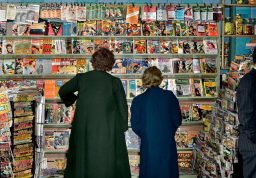The Best SHORT Science Fiction & Fantasy of 2016
Saturday , 11, March 2017 Short Fiction 17 Comments Novels get the glory. Movies get the eyeballs. Television gets the binge-watching. And video games are probably bigger than all three put together! But for my money… short fiction really is where the action is.
Novels get the glory. Movies get the eyeballs. Television gets the binge-watching. And video games are probably bigger than all three put together! But for my money… short fiction really is where the action is.
That really is the most striking things about how times have changed since the seventies. Tabletop games of the period are practically built out of bits and pieces taken from short works: Vancian magic, alignment, displacer beasts, great old ones, cyber-tanks– the list goes on and on! When people sat down to throw dice and pretend to be fantasy and science fiction heroes, short fiction was the primary driver in how they understood the genres to really work.
Even at that late date, science fiction and fantasy were not divorced into their own arbitrary and hermetically sealed genre bins. With their brains filled to the brim with pulp and New Wave fiction, gamers of the period seemed to reflexively mash countless stories together to forge hilariously awesome “anything goes” kitchen sink universes.
I think people have had enough of getting burned by authors like Donaldson, Brin, Jordan, and Martin. People are tired of authors not bothering to finish their epics before they die. They’re sick of the bloat. The cruft. The padding. Doorstopper novels that go on and on and on only to end on a cliffhanger for the next unsatisfying installment. Oh, there’s a market for this stuff, sure. But there’s also an alternative.
People don’t have to choose from a handful of big time authors serving up the same old same old anymore. They can sample all kinds of different stories in all kinds of different styles from all kinds of different authors. They can quickly find new stuff to like that they didn’t even know they would like!
Short fiction rocks. And with gatekeepers finding themselves with significantly less influence and control, we’re set to see a market correction that will create a return to the kind of vibrancy and diversity that fantasy and science fiction could take for granted in the twenties and thirties.
These are the authors that are making it happen. And these are the stories they’re doing it with.
Here’s my list of the best works of 2016:
- “Athan and the Princess” by Schuyler Hernstrom (review here)
- “A Hill of Stars” by Misha Burnett
- “In The Days of the Witch Queens” by Donald Jacob Uitvlugt (review here)
- “The King’s Dragon” by Jon Mollison (review here)
- “Only a Signal Shown” by L.E. Buis (review here)
- “The Product” by Marina Fontaine (review here)
- “The Spaces Between” by Pete Rawlik (review here)
If you don’t see your favorite there, please mention it in the comments…!
There’s a head-shaking conversation SF writers often have about short vs. long-form fiction. We hear readers complain that they don’t have time to read (and short fiction magazine sales continue to slump) — but the best-selling novels are umpty-volume series of big thick books!
“God, Robot”! All of those stories.
I didn’t realize you had reviewed L.E. Buis. Her story in “Tales of the Once and Future King” is one of my favorites.
“But for my money… short fiction really is where the action is.”
Here, here! To quote Ambrose Bierce, a novel is nothing but a padded short story.
“Images of the Goddess” by Schuyler Hernstrom
“…Where There is No Sanctuary” by Howie K. Bentley
“Into the Dawn of Storms” by Byron A. Roberts
My suspicion is that doorstoppers are largely an artifact of the minimum price point for physical works. The cost of materials, advertising, cover art, etc. are all fixed costs and represent a cost floor for the publishers. The cost per page for writing/editing pales in comparison to those. So publishers are trapped into offering thick books.
They are handcuffed into offering an extra 400 pages of words in order to justify the cover price, to the detriment of the market.
The self-publishers can writer stories that are as long as they need to be and no longer, because their price-floor constraints aren’t so iron-clad. Which is another positive thing to come out of the digital revolution.
Longer books were profitable..until some point fifteen or twenty years ago, when the big bookstores stopped offering shelfspace to any big books that didn’t sell significantly more than a shorter book.
Then, suddenly, the big house publishers reversed course, and books got a bit smaller.
But whether the stories are good at a certain length depends on the author… different authors write well at different lengths.
Also, you may notice that most of the earlier books are shorter than modern books. This is because of a change in storytelling style.
Most modern books act out the majority of scenes with full dialogue. Earlier books, before the 70s or 80s told much of their story and “showed” less.